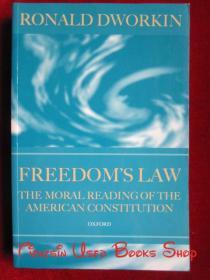
Freedom's Law: The Moral Reading of the American Constitution(货号TJ)
《自由的法:对美国宪法的道德解读》,(美)罗纳德·德沃金(Ronald Dworkin)著,刘丽君译,世界法学名著译丛,上海人民出版社。本译著收入了作者从1989年至1996年几年间所写的法哲学论文和判例评论。全书内容分为三个部分,讨论了近20年来几乎所有的重大宪法争议。书中引用了很多经典的美国最高法院的判例,这些判例都确立影响至今的宪法性原则。
¥ 338 ¥ 82 九品
仅1件
作者Ronald Dworkin(罗纳德·德沃金)
出版社Oxford University Press
ISBN9780198265573
出版时间1996
版次1
印刷时间1996
印次1
装帧平装
开本23.6*15.8
纸张胶版纸
页数438页
定价82元
货号TJ2637-I860
上书时间2024-03-04
- 在售商品 暂无
- 平均发货时间 3小时
- 好评率 暂无
- 最新上架
商品详情
- 品相描述:九品
- 商品描述
-
本书原定价71.00美元,净重640克,馆藏自然旧。【图书分类:政治、法律 > 法律 > 各国法律 > 美国法律 > 国家法、宪法】本书讨论了近20多年中几乎所有的宪法争议,如堕胎权、纠正歧视措施、色情作品、种族冲突、同性恋、安乐死以及言论自由等。作者揭示了对美国宪法的一种自由主义见解,它提供了自由主义原则的观点,并声称这些观点对我们所继承的,并至今仍确信的宪法传统提供了最佳诠释。
Ronald Dworkin argues that Americans have been systematically misled about what their Constitution is, and how judges decide what it means. The Constitution, he observes, grants individual rights in extremely abstract terms. The First Amendment prohibits the passing of laws that "abridge the freedom of speech"; the Fifth Amendment insists on "due process of law"; and the Fourteenth Amendment demands "equal protection of the laws" for all persons. What does that abstract language mean when it is applied to the political controversies that divide Americans--about affirmative action and racial justice, abortion, euthanasia, capital punishment, censorship, pornography, and homosexuality, for example? Judges, and ultimately the justices of the Supreme Court, must decide for everyone, and that gives them great power. How should they decide?
Dworkin defends a particular answer to that question, which he calls the moral reading of the Constitution. He argues that the Bill of Rights must be understood as setting out general moral principles about liberty and equality and dignity, and that private citizens, lawyers, and finally judges must interpret and apply those general principles by posing and trying to answer more concrete moral questions. Is freedom to choose abortion really a basic moral right and would curtailing that right be a deep injustice, for example? Why? In the detailed discussions of individual constitutional issues that form the bulk of the book, Dworkin shows that our judges do decide hard constitutional cases by posing and answering such concrete moral questions. Indeed he shows that that is the only way they can decide those cases.
But most judges--and most politicians and most law professors--pretend otherwise. They say that judges must never treat constitutional issues as moral issues because that would be undemocratic--it would mean that judges were substituting their own moral convictions for those of Congressmen and state legislators who had been elected by the people. So they insist that judges can, and should, decide in some more mechanical way which involves no fresh moral judgment on their part.
The result, Dworkin shows, has been great constitutional confusion. Is the premise at the core of this confusion really sound? Is the moral reading--the only reading of the American Constitution that makes sense--really undemocratic? In spirited and illuminating discussions both of the great constitutional cases of recent years, and of general constitutional principles, Dworkin argues, to the contrary, that the distinctly American version of government under principle, based on the moral reading of the Constitution, is in fact the best account of what democracy really is.
Written by the world's best-known political and legal theorist, Freedom's Law: The Moral Reading of the American Constitution is a collection of essays that discuss almost all of the great constitutional issues of the last two decades, including abortion, euthanasia, capital punishment, homosexuality, pornography, and free speech. Professor Dworkin offers a consistently liberal view of the Constitution and argues that fidelity to it and to law demands that judges make moral judgments. He proposes that we all interpret the abstract language of the Constitution by reference to moral principles about political decency and justice. His 'moral reading therefore brings political morality into the heart of constitutional law. The various chapters of this book were originally published separately and are now drawn together to provide the reader with a rich, full-length treatment of Dworkin's general theory of law.
Amazon.com Review:
Freedom's Law is Dworkin's impassioned defense of free speech and conscience. The thread that ties these essays together is his criticism of strict historical interpretation of the Constitution, which holds that our modern-day understanding must be strictly limited to the concerns of the Constitution's framers, rather than the underlying principles embodied within. Divided into three parts, the book examines the soundness of Roe v. Wade, defends a broad reading of the First Amendment and attacks the nominations of Robert Bork and Clarence Thomas.
From Publishers Weekly:
Integrity in law, says Dworkin, law professor at Oxford and NYU, must first "be a matter of principle, not compromise or strategy or political accommodation." But while Americans are increasingly hungry for political and personal morality, moral principal in interpreting the Constitution is still unfashionable. Witness Supreme Court nominees like Robert Bork and Clarence Thomas, who claimed either the seemingly neutral "original intent" reading(in Bork's case) or no constitutional philosophy at all (in Thomas's). In five chapters on those two justices, Dworkin makes a persuasive argument that these are nonetheless moral and political positions. But most of the 17 chapters (all but three of which originally appeared in the New York Review of Books) center on issues like abortion, affirmative action and freedom of speech. What's interesting here is to see the application of Dworkin's moral reading throughout, which in unavoidably simplistic terms is this: true democracy is not crude majoritarianism but rather a "constitutional conception" in which "collective decisions [are] made by political institutions whose structure, composition, and practices treat all members of the community, as individuals, with equal concern and respect," and that to safeguard this democracy it is necessary to protect "nega-tive" liberties like free speech and privacy even if it curtails "positive" liberties like the ability to control or participate in public decision making. This rejection of the framers' intent and of majoritarian rule continues themes Dworkin addressed in Life's Dominion and Taking Rights Seriously. But this book stands on its own either as a continuation or an introduction. Complex and compelling, learned and readable, it goes to the heart of what it means to live in a democracy and, through concrete details, illuminates a very real, very admirable principle.
Copyright 1996 Reed Business Information, Inc.
Review
Eloquently written and forcefully argued. (Richard A. Epstein New York Times Book Review)
Should be read as the most lucid and convincing partisan brief for the `liberal' position in contemporary constitutional disputes...Dworkin is almost always right about legal principles and always elegant. (Mortimer Sellers Washington Post)
A rich, learned and profound [book]...It is [the] 'originalist' approach--that we must go strictly by the words in the Constitution and avoid creative interpretations--that Dworkin disputes in this collection of essays...[Dworkin's] ideas are stimulating and his writing is able, forcible and clear. (David Mehegan Boston Globe)
An elegant series of essays...on difficult topics of constitutional principle. [Dworkin] analyses, with force and clarity, the rights of citizens in relation to abortion, euthanasia, affirmative action, libel and pornography. He complains, with justification, that judges--and politicians--continue to pretend, at least in public, that, even in hard cases, the judicial function is mechanical rather than creative. He argues that only when we openly recognize that judges necessarily make contemporary judgments of political morality, albeit constrained by integrity to respect existing legal principles, can adjudication in hard cases be reconciled with democratic accountability. If the public understands what is being done on its behalf, then it has the opportunity to influence the development of the law by comment and criticism...Professor Dworkin's analysis of adjudication in hard cases has as much force on this side of the Atlantic Ocean...[and] is recommended to everyone interested in jurisprudence. (David Pannick The Times)
At all times, Dworkin's writing is superb, clear, engaging, and erudite...The innately interesting material that he discusses will draw in many who might otherwise believe that this book is about complicated issues that they cannot understand. It is complicated, but Dworkin serves these issues up in bite-size pieces that most people can comprehend and these are issues that should matter to citizens who care about the Constitution and the judges who interpret the laws. (Sally E. Hadden Allenstown Historian)
A familiar criticism of the American way of law is that judges, especially justices of the U. S. Supreme Court, presume to govern as philosopher-kings. Ronald Dworkin is perhaps the country's most unabashed intellectual advocate for the idea that this is precisely what the judges ought to be doing. In this collection of essays Dworkin supports a right to abortion, euthanasia, affirmative action, and a view of free speech that not only embraces academic freedom but would also do away with most of the laws against libel and slander...Dworkin's is a powerful mind, and there is much here that is provocative, even some that is persuasive. (Maimon Schwarzschild Ethics)
Whether or not readers agree with Dworkin on every point, they will come away from this thought-provoking book with a new respect for the Constitution as a vital, ethical document. (Publishers Weekly (named a PW Best Book of 1996))
About the Author:
Ronald Dworkin is Sommer Professor of Law and Philosophy at New York University and Jeremy Bentham Professor of Jurisprudence at University College London. He is the 2007 recipient of the Holberg International Memorial Prize.
-

【封面】
-

【封底】
-

【目录】
-

【内页】
-

【内页】
— 没有更多了 —












以下为对购买帮助不大的评价